Trivium look back on Ascendancy and their rise to the top
Matt and Corey reflect on 10 years of Trivium and new album Silence In The Snow
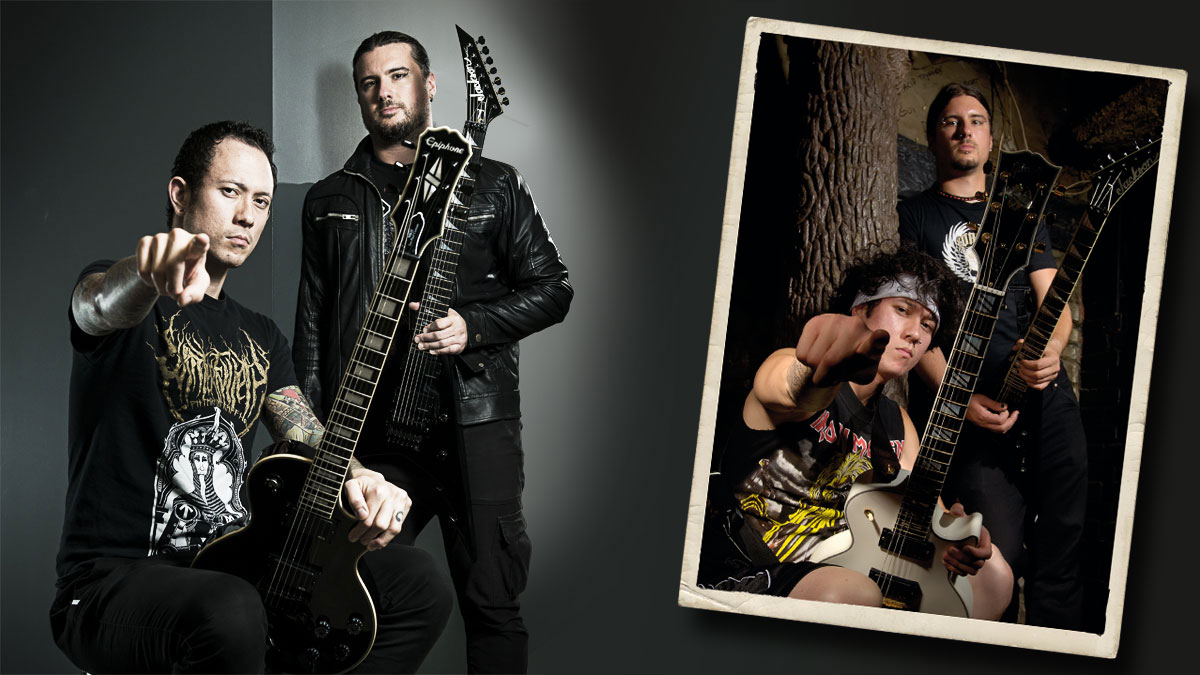
Introduction
A decade on from landmark album Ascendancy, Trivium’s Matt Heafy and Corey Beaulieu look back on the players they were, and their progression to new LP, Silence In The Snow.
It was late 2005 when a bunch of young scruffy Floridians elevated themselves from relative obscurity and became the hottest band in metal. With second album Ascendancy – which came a year after inking a deal with legendary label Roadrunner – Trivium had somehow trapped lightning in a bottle and created a sound that reinvigorated the genre. It was a Frankenstein’s monster that ushered in new ideas without straying too far from metal’s rich heritage.
That’s how the songs on Ascendancy came about – just some dudes with nothing to do, no fans, no job, no nothing
Soon they would be on magazine covers, in constant rotation across the airwaves and getting singled out by their heroes Metallica as one of heavy music’s brightest hopes. 10 years on, guitarists Matt Heafy and Corey Beaulieu reflect on the album that changed their lives forever, and contemplate the next chapter of their career…
What do you remember about writing and recording Ascendancy?
Corey: “I joined the band right after I graduated from music university. I had no job and nowhere to live, so I was living out of my car for a while, and then started crashing round Matt’s house. He was still in high school, so once he’d finish his studies we’d all meet at the warehouse and jam for hours. We had nothing else to do but play and write.
“That’s how pretty much all the songs on Ascendancy came about – just some dudes with nothing to do, no fans, no job, no nothing. By the end of that album and beginning of The Crusade, we already had done our first TG cover. I think it was when Matt had more of a bowl cut with short black hair…”
Matt: “Come on! It was a questionable swoop, not a bowl cut. I was about 17 years old and still living at my parent’s house. We just played what we wanted to hear as fans of metal. And all these different sounds began to creep in: death metal, melodeath, trad metal, hardcore… It became a melting pot of influences that probably shouldn’t go together.”
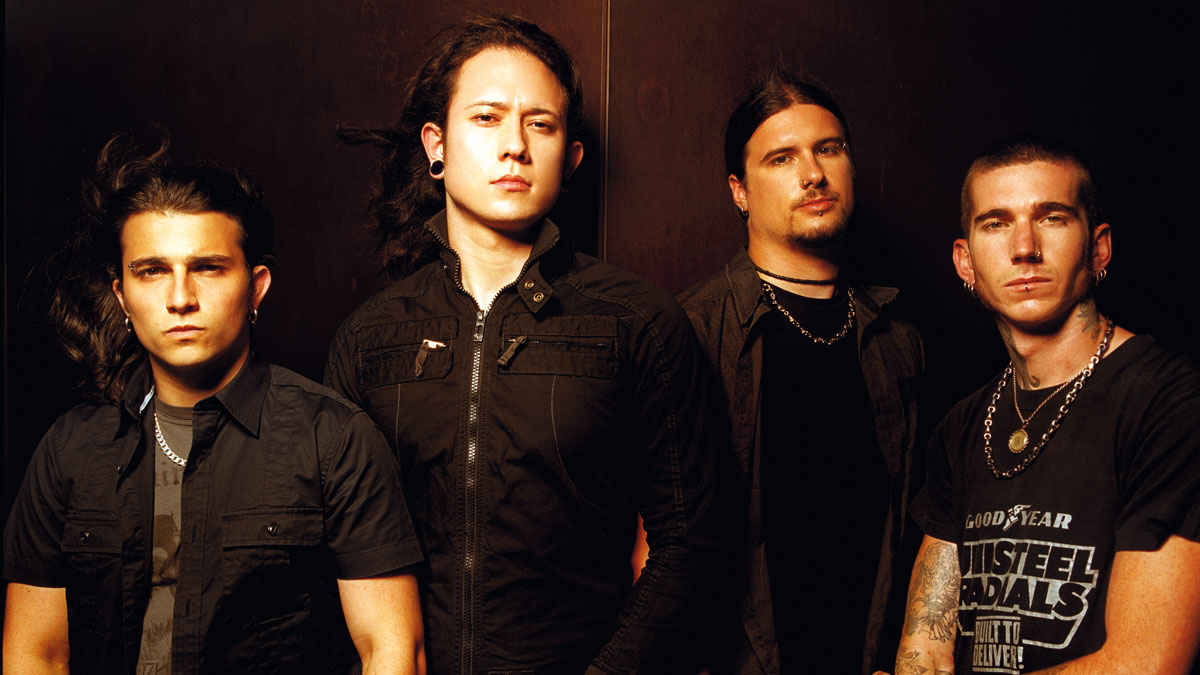
Lighting in a bottle
Did you have any idea you were making a record that would have such an impact?
Corey: “I’d say 60 per cent of that stuff was written totally off the cuff. Rain, Pull Harder On The Strings Of Your Martyr, Like Light To The Flies… those came from jamming. I remember playing the intro, suddenly we wrote the rest, meshed it all together and boom! In a couple of hours of jamming, it was finished. Looking back, it’s crazy how so many of these songs were made in a shitty warehouse after hearing the words, ‘Play something!’”
A Gunshot... was written on a day off in the outskirts of Vegas, sat inside some disgusting motel.
Matt: “I remember being sat on my sofa playing the intro riff to Pull Harder… and thinking, ‘I need to remember this.’ So I brought it into practice and [original drummer] Travis Smith said he’d also written a drum part the same night. So we counted to four and just went for it. It was that easy.
“A Gunshot To The Head Of Trepidation was written on a day off in the outskirts of Vegas, sat inside some disgusting motel. We were young and stupid, so obviously we’d been up all night partying. I found this machine-gun riff and Travis started playing on his drum pads.
“We thought it was all locking perfectly in unison, probably because of the long days and tiredness. But it didn’t lock up and that ended up becoming the beauty of it!”
Was it hard to keep your garage band ethics as your profile rocketed?
Corey: “A lot of musicians nowadays are playing in their bedrooms, making videos on YouTube, using software like EZ Drummer to make good quality home-recordings. But the beauty behind Ascendancy is that it came from a bunch of guys in a room, bouncing ideas off each other.
“When you’re sat by yourself in front of a fuckin’ computer, you won’t have that. We’ve used this approach on all our records, except Vengeance Falls, which had a lot of pre-production and editing. Some things might sound great on a laptop, but when you actually play it as a band, it might not work as well. To the point where we kinda have to alter some of that stuff live to make it feel different or more comfortable.”
Matt: “I have to be able to play it and sing it. Like when James Hetfield writes a vocal part, he’s playing guitar first and it’s about what fits over the part he’s playing. Take Walk by Pantera – although it’s a simple guitar part, it’s very difficult to play and sing because those two rhythms are opposite to each other. On The Crusade and Vengeance Falls, I didn’t really think that through.”
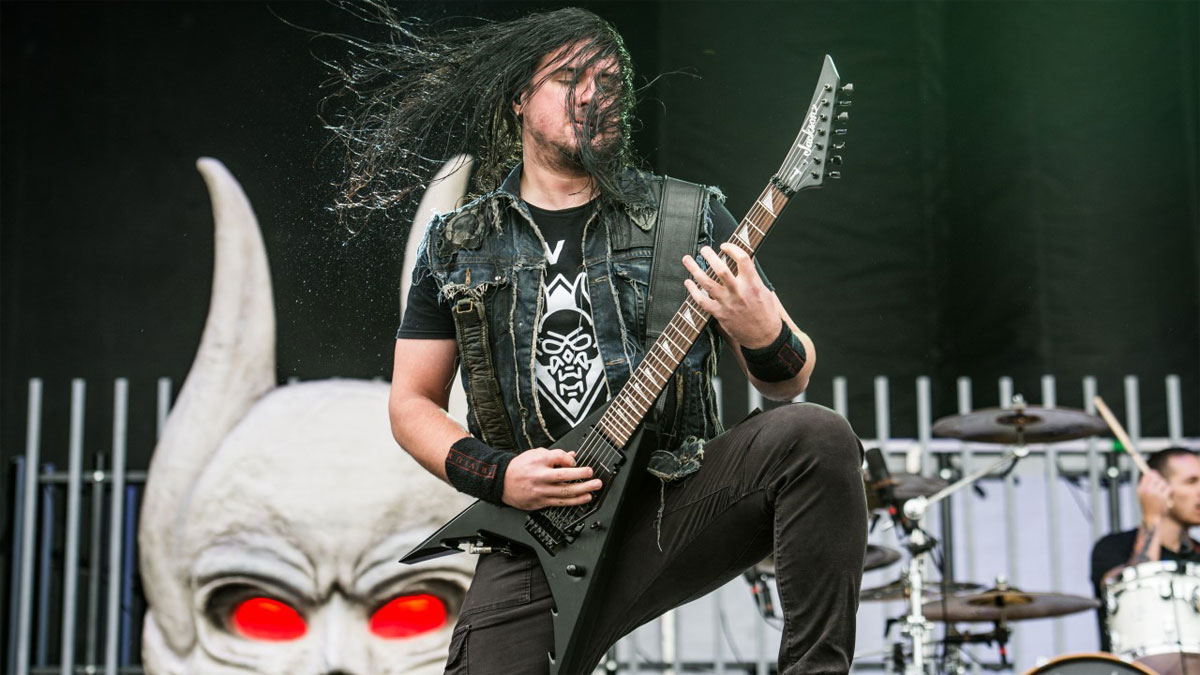
Still learning
What do you hear when you listen back to your early records, especially compared to the music you’re making now?
Corey: “With each album, I can hear my own development in the tone, vibrato or bending. None of that stuff sounded hugely confident on Ascendancy. I can’t guess how many hours of playing I’ve accumulated since we made it! I don’t look for technicality, it’s more about the emotion in your playing.
I’m taking lessons again from a classical guy who’s teaching me how to read and seeing if there are any holes in my guitar playing
“On our fourth album Shogun, I was a lot more shreddy, but the new record Silence In The Snow has more precision. I’m thinking more about note choices and phrasing. I’ve always liked solos that you can sing along to, so while burning through 8,000 scales and arpeggios can be fun, it’s not going to bring much emotion out of people.
“If you listen to Slash, George Lynch or Marty Friedman, there’s technicality, but more importantly creativity and catchiness. And it’s the same with Matt’s vocals: on Ascendancy he sounded like an 18-year-old kid… but now he sounds like a beast!”
Matt: “Even as a teenager, I was already very regimented with my practicing, I’m still the same today. I’ve been getting into Jiu Jitsu over the past few years, and that’s reminded me what it feels like to put hard work into something.
“I walked into the hardest thing I’ve ever done. The first day I sparred with someone, it was some 120-pound kid and I thought, ‘I’ve got this!’ And he choked me out in 30 seconds! That really humbled me.
“So I’ve reinstated that same idea with music. I’m taking lessons again from a classical guy who’s teaching me how to read and seeing if there are any holes in my guitar playing. I’m taking singing lessons, cooking lessons, yoga classes… Martial arts reminded me what it was like to get good at things, and I’ve applied that everywhere in my life.”
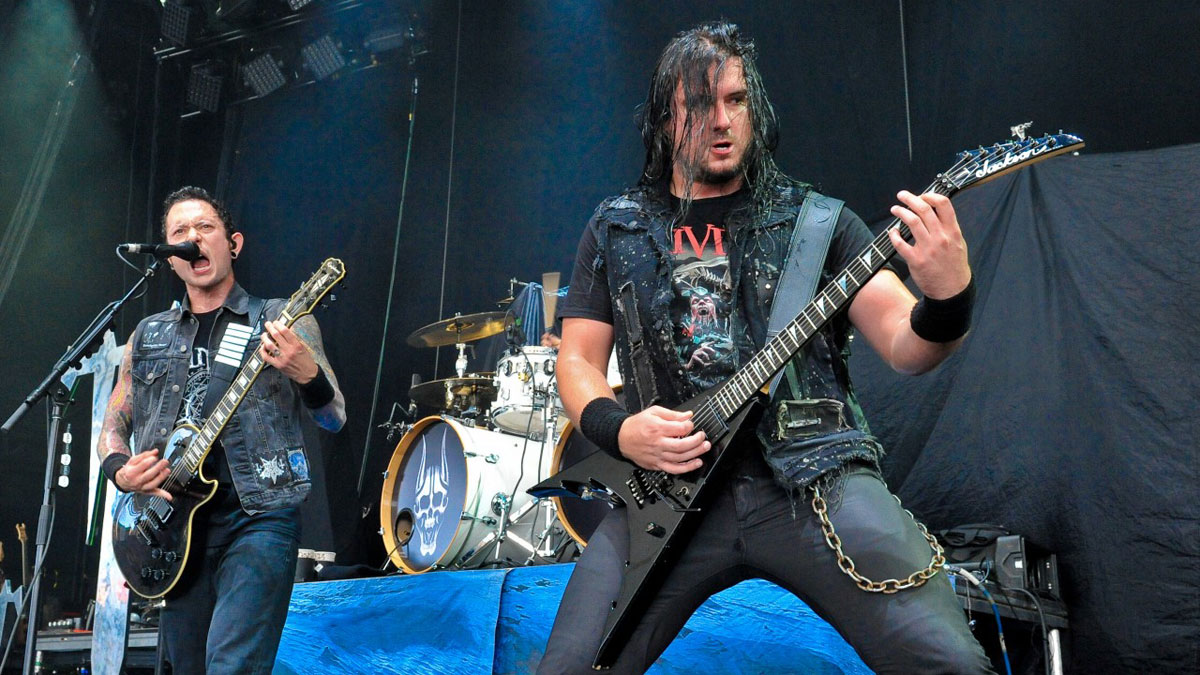
The seven-strings ride again
We notice the seven-strings are back…
Matt: “It all stems back from the title track, which was actually written in 2007 around the Shogun sessions. It was supposed to be on the record, but didn’t fit stylistically. It’s a very simple song and simplicity is kinda scary – it shows the flaws in your playing if you’re not up to scratch. Then last year we started writing this seventh album and we decided to bring Silence… back.
“Since it was written on a seven-string, it led to us using them again. I was inspired by [Norwegian metal legend] Ihsahn who uses a drop tuned seven-string a lot. I don’t know if we’ll ever go to eight-strings, but I love the way Ihsahn uses them, because he actually uses all the strings!”
A lot of metal guitarists will dial in loads, but I find things sound heavier with less
Corey: “The last two albums have been strictly in drop D. Since we hadn’t used seven-strings in a while, it felt really fun and invigorating to work with the darker sonic tones the instrument can offer. Obviously you don’t want to use that low B all the time, but it’s fun to jump to that sonic register for a thicker sound.
“There are a couple of dropped D songs too. Moving from one to the other, it really allows each song have its own vibe. Halfway into the record, it doesn’t feel like you’ve heard the same song six songs. Things gets boring when it’s all in the same key...”
What other gear did you end up using?
Corey: “We kept things simple. We don’t go too crazy with pedals when it comes to tracking. The main rhythm tones are an EVH 5150III, for all the non-solo melodies I use my Kemper, which has a lead patch that I really like.
The fewer things in between my fingers and what the audience hear, the better
“The solos were all done on a KSR Colossus. That made sure everything had its own unique sound. We used a sitar for the intro to Breathe In The Flames, which just came from joking around one night. There was one lying around in the studio and it ended up sounding really cool, like Metallica’s Wherever I May Roam!”
Matt: “The guitar for all my rhythms was my Epiphone signature. I tried everything else and nothing sounded better, so I’ll definitely be doing that again next time. A lot of the reason why this record sounds so good is because it’s pretty minimal, there isn’t much going on and there’s surprisingly little gain.
“A lot of metal guitarists will dial in loads, but I find things sound heavier with less. And to be honest, the fewer things in between my fingers and what the audience hear, the better.”
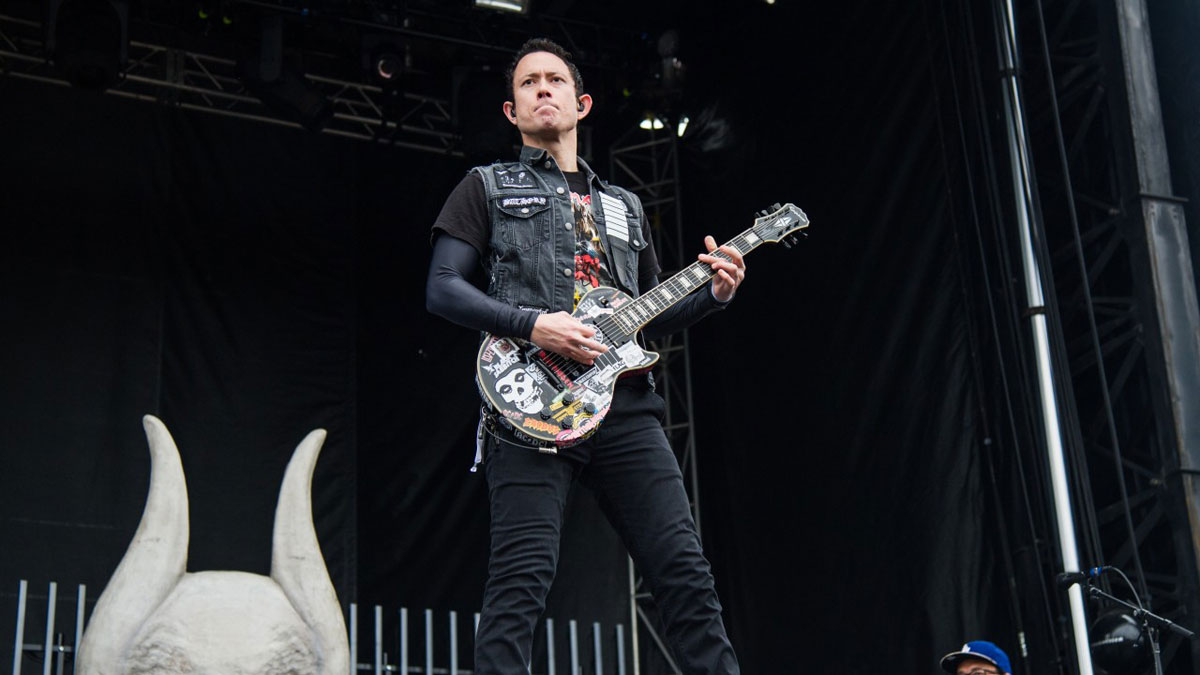
Cleaning up
Blind Leading The Blind and The Thing That’s Killing Me showcase some of your strongest clean vocals yet, Matt. How have you changed as a singer?
Matt: “Well, two years ago I blew my voice out and had to fly home and cancel our tour. Our crew guys had to go home unpaid, I felt awful. When I landed I got a text from M Shadows from Avenged Sevenfold saying, ‘Sorry to hear you blew your voice, is there anything I could do to help?’
I learned a screaming technique that was 100 per cent different. For 15 years I had been doing it incorrectly and damaging my vocal chords
“And I asked what he did when it happened to him, so he put me in touch with his singing tutor Ron Anderson, who was taught by Freddie Mercury’s teacher. He’s helped Axl Rose, Janet Jackson, Chris Cornell… everybody that’s amazing at singing, basically.
“I learned a screaming technique that was 100 per cent different. For 15 years I had been doing it incorrectly and damaging my vocal chords. I’m very lucky I didn’t permanently screw myself up. Now I’ve got the safe way, it works and sounds great.
“I used to think singing should be hard, but that’s not true at all. For 15 years, I’ve been belting my lungs out – I would almost black out and get headaches when recording. I would strain my vocals and ended up losing range, which is why we started tuning down because I couldn’t go as high as I used to. Thankfully that’s changed!”
Dead And Gone has an almost tech-metal feel, especially the slow bend in the verse…
Matt: “That was actually written by our bassist Paolo, he is the slow bend writer in band! He wrote In Waves and that was the song that changed our sound. It was a moment where we embraced simplicity and weird grooves, finding a balance in between and something we still aim for. So that type of stuff is always him. And I think he’s the master of it!
“Vibrato is something that’s lost on a lot of the technical players today. Bends are so important… it’s like some people can shred, but they can’t hold a note. Some players seem to skip that bit of the process.”
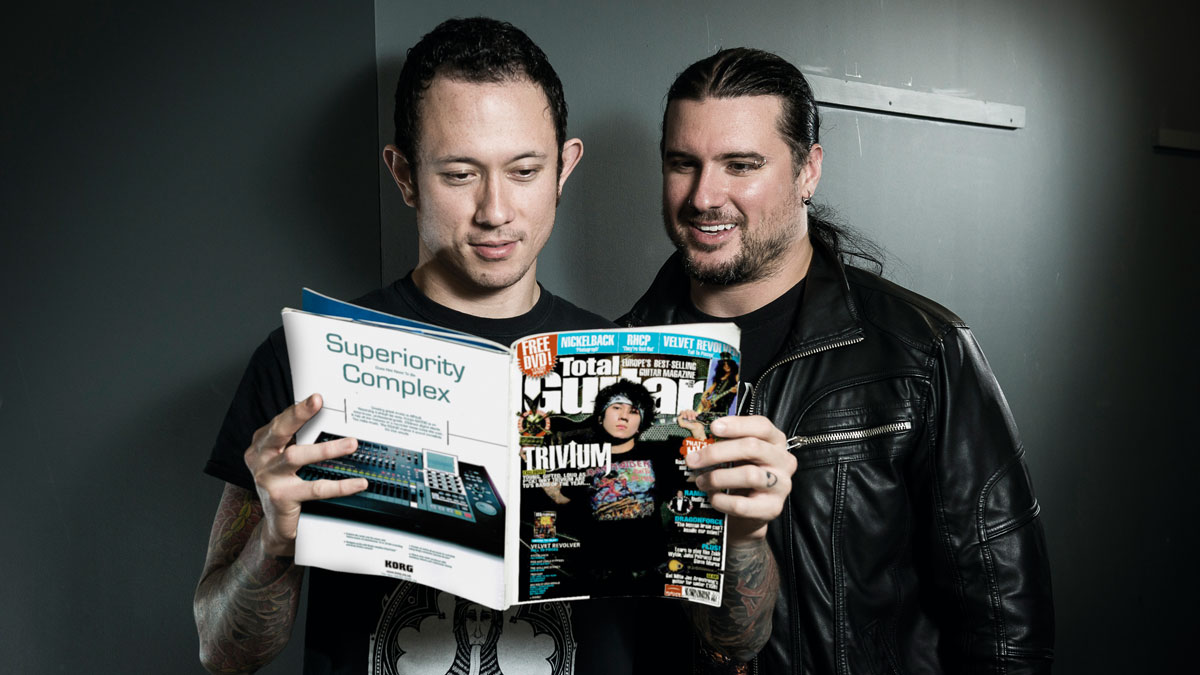
To the future
Where do you see Trivium in 10 years?
Matt: “There’s that famous quote from the early days when we got asked what our goals were and I answered, ‘We want to be the next Metallica!’ I didn’t know what else to say… But soon people started wondering who the hell are these kids comparing themselves to Metallica?
We still want to be the kind of band that can change metal, and play arenas with more pyro than Rammstein!
“But looking back, no one should be ashamed of what their life goals are. We still want to be the kind of band that can change metal, and play arenas with more pyro than Rammstein!”
Corey: “We’ve been lucky enough to headline festivals like Bloodstock. And those big stages are where we feel at home, playing them has made us more hungry! We’ve been doing this for 10 years and Silence… feels like the milestone for us to start the next 10.
“We’re at a point in our career where we want to grab it by the throat and kick everyone’s ass. Being the headliner is not an easy torch to get passed. You have to earn your stripes, survive the pitfalls, and have a body of work that is worthy of the crowds. You don’t get handed that and we’re still working our asses off to get there.”
Trivium’s new album, Silence In The Snow, is out now on Roadrunner.
Amit has been writing for titles like Total Guitar, MusicRadar and Guitar World for over a decade and counts Richie Kotzen, Guthrie Govan and Jeff Beck among his primary influences. He's interviewed everyone from Ozzy Osbourne and Lemmy to Slash and Jimmy Page, and once even traded solos with a member of Slayer on a track released internationally. As a session guitarist, he's played alongside members of Judas Priest and Uriah Heep in London ensemble Metalworks, as well as handling lead guitars for legends like Glen Matlock (Sex Pistols, The Faces) and Stu Hamm (Steve Vai, Joe Satriani, G3).


